Croatian banknotes
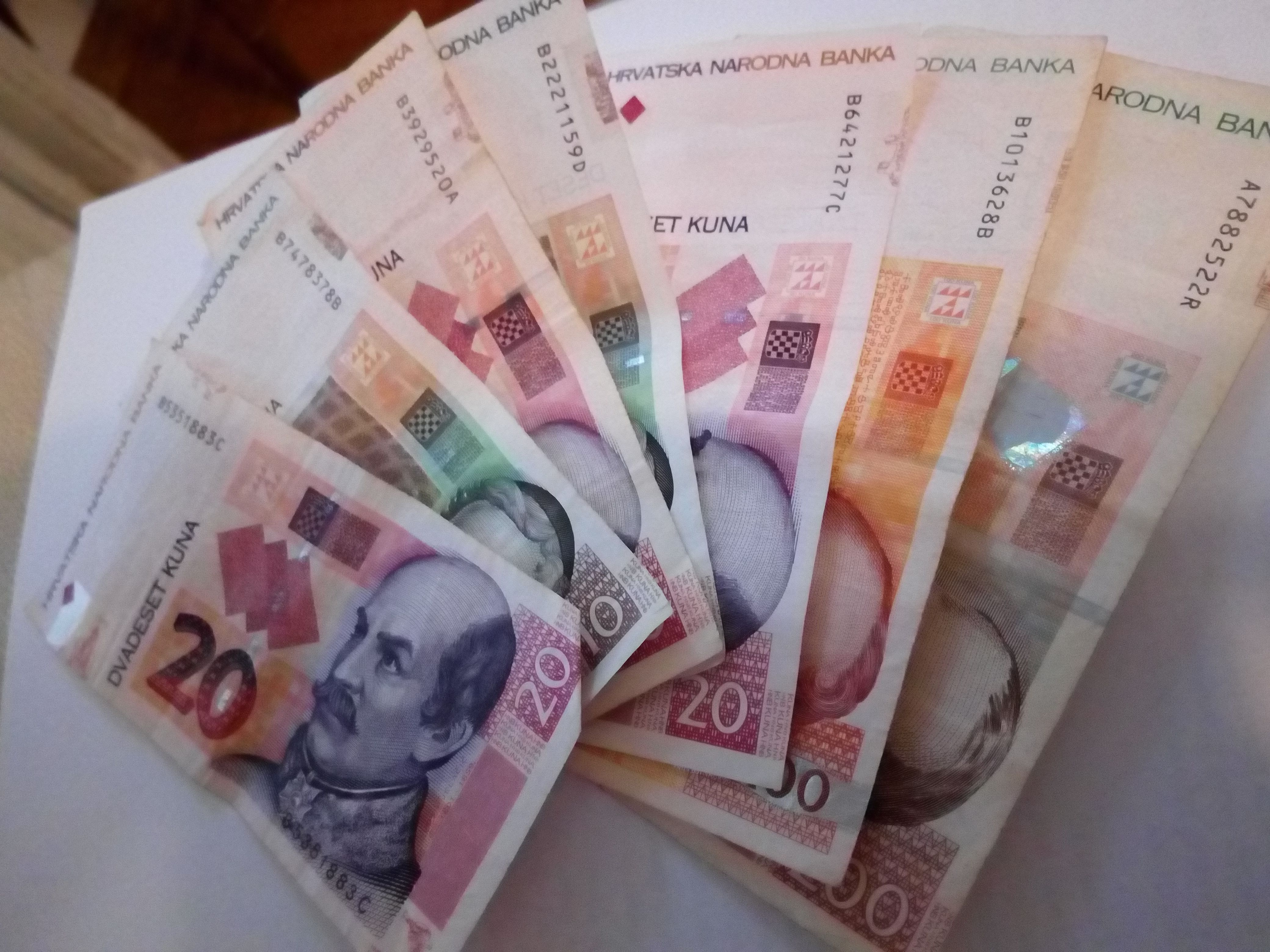
Considering that I have studied history, I believe that Croatian money (Kuna) indicates a short guide through the Croatian history. Our currency is abundant with symbolism, and the front of each banknote always shows one of the known Croats, regardless of being a politician, a writer or a bishop.
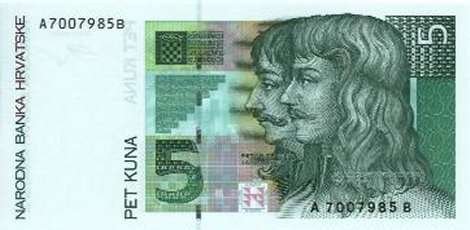
A 5-kuna paper note is no longer used, and its value is now tied to a coin. The portrait of Fran Krsto Frankopan and ban Petar Zrinski. On April 30, 1671, Petar Zrinski and Fran Krsto Frankopan were executed in Bečko Novo Mjesto near Vienna due to the fact that they were the leaders of antiHabsburg movement. Before his death, Petar Zrinski wrote a touching farewell letter to his wife, Katarina, who also was the sister of Fran Krsto Frankopan.
http://povijest.net/oprostajno-pismo-petra-zrinskog/ (farewell letter)
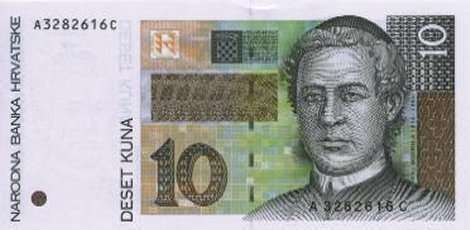
At ten kuna note is the Istrian bishop Juraj Dobrila. Juraj Dobrila, a famous bishop, beneficiary and reverend, was born on 16 April 1812 in Veli Ježenj. He was known as a beneficiary, and left all his property after his death to charity purposes. The University of Pula was called after the bishop and is titled the University of Juraj Dobrila.
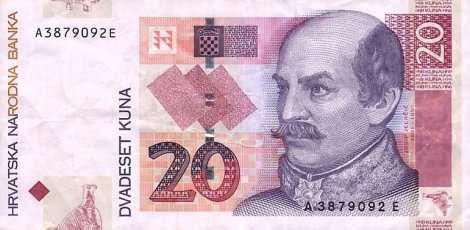
In the twenty kuna banknote is the portrayal of the Croatian ban Josip Jelačić. Josip Count Jelačić Bužimski (Petrovaradin, October 16, 1801 - Zagreb, May 20, 1859) was a General and a Ban of Croatia from 1848 to 1859, a member of the Jelačić noble family and one of the most important Croatian politicians, both in the 19th century and throughout the history of Croats. He abolished serfdom and called the first elections for the Croatian Parliament. As a leader, he won a series of battles against the uprising in the Habsburg Monarchy during the Revolution in Hungary in 1848. In Croatia, Ban Jelačić is celebrated as a national hero and the main square in Zagreb is called after him.
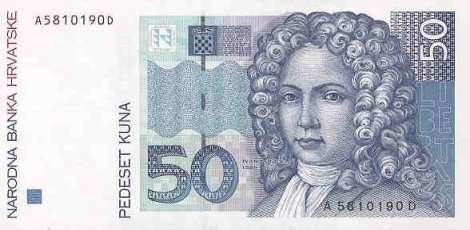
On fifty kuna banknote is the portrait of the Dubrovnik poet Ivan Gundulić. He is the author of a historical-romantic play Osman, a drama in verse, and has also affirmed Christianity as being a Christian writer.
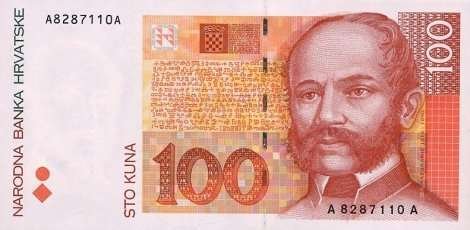
In hundred kuna banknote is the portrait of the Croatian ban and poet Ivan Mažuranić. One of the greatest Croatian reformers, a poet, a linguist, a politician and a popular count Ivan Mažuranić was born on August 11, 1814 in Novi Vinodolski. Mažuranić has improved Croatia in administrative, economic, cultural and educational terms. His initiative introduced the responsibility of the Parliament, the division of judiciary and administration and the independence of judges.
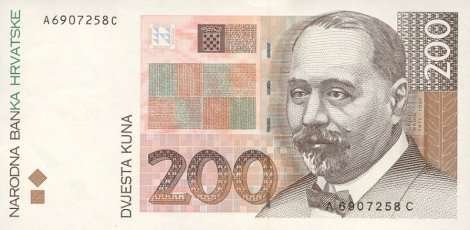
In the two hundred kuna banknote is the portrait of the politician Stjepan Radić. Sjepan Radić was a Croatian politician, writer, translator and publicist. The first graduated Croatian political scientist with a certificate. He is one of the greatest politicians of the Croatian history.
He died in 1928 as a result of the severe wounding during the National Assembly in Belgarde along with several other Croatian national deputies: such drastic political assassination showed the depth of division arisen after only ten years of old Yugoslavia state. Radić's political influence and the circumstances of his death left a deep mark on Croatian political culture. His famous saying was "Gentlemen, it is not too late! Do not blot out like gulls in the fog."
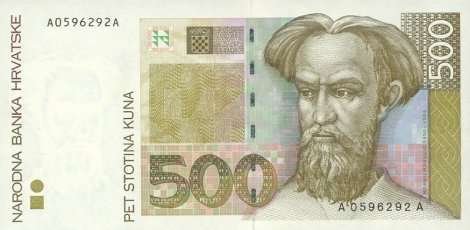
On the five hundred banknote is the portrait of the writer Marka Marulić, who was very proud of his famous Split background. Marko Marulić is a writer and a Christian humanist, the father of Croatian literature. His local ethnicity demonstrated towards Split is often attributed to him. He left a rich and varied opus, characterized by extraordinary literary styling, knowledge and skill, and the ability to adapt.

On the thousand kuna banknote is the portrait of the politician Ante Starčević. Ante Starcevic was the leader, the prophet, the teacher and the father of his homeland, the most powerful writer and the most critical of politicians. He is the founder of a modern Croatian state-minded ideas and a powerful fighter for Croatian independence, who has selflessly devoted his life to his homeland and is therefore called the Father of Homeland "Otac domovine".
@resteemator is a new bot casting votes for its followers. Follow @resteemator and vote this comment to increase your chance to be voted in the future!